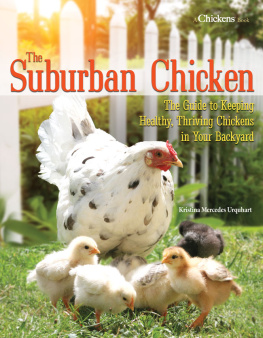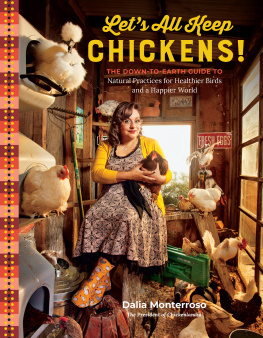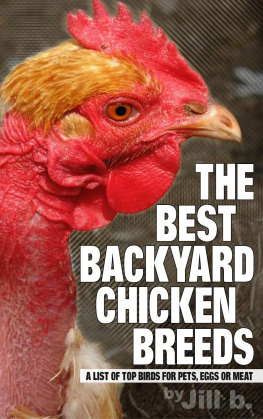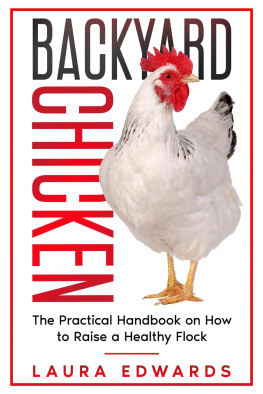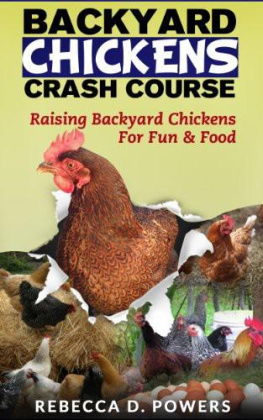Special thanks to my original flock of girls, Loretta, Prudence, Penny, Eleanor, Martha, Madonna, Rita, Sadie, and Yoko, for introducing me to the silly, wonderful world of keeping chickens.
The Suburban Chicken
Project Team
Editor: Dolores York
Design: Mary Ann Kahn
i-5 PUBLISHING, LLC TM
Chairman: David Fry
Chief Financial Officer: David Katzoff
Chief Digital Officer: Jennifer Black-Glover
Chief Marketing Officer: Beth Freeman Reynolds
Marketing Director: Cameron Triebwasser
General Manager, i-5 Press: Christopher Reggio
Art Director, i-5 Press: Mary Ann Kahn
Senior Editor, i-5 Press: Amy Deputato
Production Director: Laurie Panaggio
Production Manager: Jessica Jaensch
Copyright 2015 by i-5 Publishing, LLC TM
All rights reserved. No part of this book may be reproduced, stored in a retrieval system, or transmitted in any form or by any means, electronic, mechanical, photocopying, recording, or otherwise, without the prior written permission of I-5 Press TM , except for the inclusion of brief quotations in an acknowledged review.
Library of Congress Cataloging-in-Publication Data
Urquhart, Kristina Mercedes, author.
The suburban chicken : the guide to keeping healthy, thriving chickens
in your backyard / Kristina Mercedes Urquhart
pages cm
Includes index.
ISBN 978-1-62008-197-6
1. Chickens. 2. Suburban animals. I. Title.
SF487.U77 2015
636.5--dc23
2015023997
eBook ISBN: 978-1-62008-222-5
This book has been published with the intent to provide accurate and authoritative information in regard to the subject matter within. While every precaution has been taken in the preparation of this book, the author and publisher expressly disclaim any responsibility for any errors, omissions, or adverse effects arising from the use or application of the information contained herein. The techniques and suggestions are used at the readers discretion and are not to be considered a substitute for veterinary care. If you suspect a medical problem, consult your veterinarian.

i-5 Publishing, LLC
www.facebook.com/i5press
www.i5publishing.com
7: You Are What You Eat

Once you learn what to feed them, how often to feed them, and you have a good feeding and storage system established, the process of feeding your chickens will become rather effortless. It wont take long to get into an easy rhythm of filling the feed bucket, then moseying out to the coop, filling the feeder, and collecting the eggs. In fact, I find the routine rather meditative in its simplicitytheres something really gratifying about bringing nourishment to your ladies, watching them eat so excitedly, and then gathering a handful of eggs in return.
As with most growing animals, a flock of laying hens requires different nutrients at different life stages and throughout different seasons of the year. And your charges will source it from the selection of balanced feed you provide. This chapter covers the basics of flock nutrition, the feed youll need, and what to look for in a quality commercial feed. Your flocks extra dietary and digestive needs will largely be met by the variety of supplements provided in addition to daily feedwell cover those in more detail, too. Finally, nothing wins over a flock of chickens like a good treat. My advice to any new chicken keeper is to provide a balanced daily feed ration first, allow some forage time, and then shamelessly enjoy bonding and building trust with your chickens by offering fun treats (in moderation, of course). Thats the secret every chicken keeper knows: The way to a chickens heart is through her crop. Lets look at how to get there.
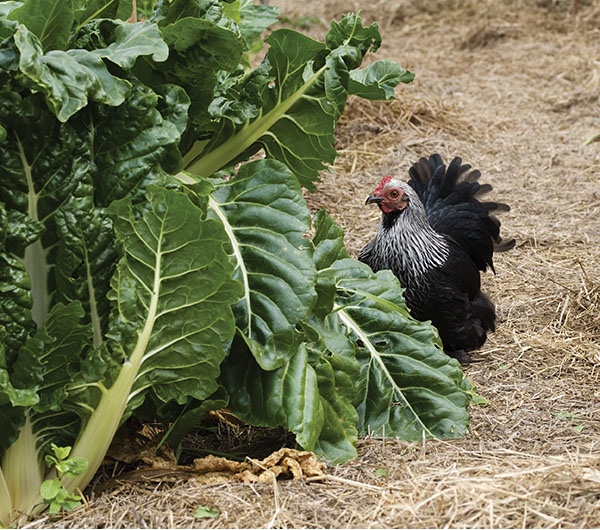
Chickens are opportunistic and will forage for a variety of edible plants, seeds, and bugs.
For Starters: Forage
Eatingthats what chickens do best. Nature has expertly designed them to convert a variety of edible plants, insects, seeds, and other living things into fuel for their daily activities: dust-bathing, grooming, roosting, egg laying, chick rearing, and evading predators (staying alive is hard work, after all). And chickens are certainly happier when theyre able to realize their true nature. Foraging is a very basic part of being a chicken. Its their livelihood.
So why have modern chickens been converted to a diet consisting almost solely of cheap grains? Well, unlike ruminants such as cattle (whose seven stomachs evolved to digest grasses best), chickens are fairly good at converting grains and legumes, such as corn and soy, into the protein of their meat or eggs. But just because they can doesnt mean they should . When lacking a varied diet (and in particular, the greens found on pasture), a chickens egg and meat quality plummets; the good omega-3 fatty acids decline, and the omega-6 fatty acids skyrocket. Its no wonder the chicken egg has developed a reputation for being an unhealthy source of cholesterol and bad fats and is often written off as a harmful food. In reality, the modern chicken has just been producing the best egg it can on the feed it is given.
Upon learning this, my knee-jerk reaction was to set all of my hens free to forage for their food on our property. But after learning more about chicken nutrition, I realized that this extreme wasnt the best route, either. Unlike their ancient Asiatic ground fowl ancestors (or the feral Key West chicken, for that matter), domesticated poultry are rarely able to meet all of their nutritional needs by foraging. Small backyards or suburban lots do not have substantial fare to support a flock for very long, if at all.
The bottom line is that varietyand balanceis best. In addition to a well-rounded commercial feed, give your gals a chance to stretch their wings and legs by grazing on grass for a few hours each day. Just because they eat commercial feed ration doesnt mean they need to stay cooped up; any time spent foraging will be great for morale, alleviating boredom, providing exercise, and supplementing their diet. Theyll be happier if they can realize their true chicken nature, and both you and your flock will find the time fun and entertaining. And, if your birds must stay confined to a coop, run, or enclosure, give them some greens as treatsbetter yet, grow them. (See Green Grows the Garden below for some great ideas.) Your chickens, their eggs, and ultimately your diet will be healthier for it.
Green Grows the Garden
If your flock does not have access to pasture, for whatever reason, a great way to give them their greens is by growing a small chicken garden. Really, a chicken garden is no different from your own. If you already grow food, theyll happily gobble up your garden scraps and extra greens. But if you find yourself really limited on space, try these options for growing greens for your gals.
Container Gardening. Salad greens (like mesclun mixes and arugula); dark, leafy vegetables (such as kale, spinach, and chard); cherry tomatoes; herbs; and so many more cultivars will thrive in pots. Place them on a sunny windowsill indoors, plant them in window boxes on your house or coop, or find a corner of the flower bed to put in a few edible plants. Your birds wont need much, but the variety to their diet will vastly improve their health and the nutritional value of their eggs.
Sprouting. Its so easy to create an indoor sprout garden. Moreover, its inexpensive, available to just about everyone, and the health benefits are enormous. All edible seeds, grains, and legumes may be sprouted. Wheat (preferably organic), corn, barley, alfalfa, mung beans, peas, pumpkin seeds, radishes, and carrots are all popular choices for sprouting.
Next page
